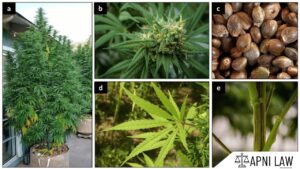Introduction
Section 21 and 22 of the Narcotic Drugs and Psychotropic Substances (NDPS) Act, 1985, deals with offenses related to manufactured drugs and their preparations. This section punishes individuals who engage in illegal activities such as manufacturing, possessing, selling, or transporting such drugs. The law categorizes offenses based on the quantity involved9, small, intermediate, and commercial and imposes varying levels of punishment accordingly.
What Is Section 21 of NDPS Act
Section 21 of the NDPS Act punishes anyone who illegally deals with manufactured drugs or their preparations. This includes manufacturing, possessing, selling, purchasing, transporting, importing, exporting, or using such drugs without following the law.
Penalties Based on Quantity
- Small Quantity
Punishable with rigorous imprisonment up to 1 year
- Or with a fine up to ₹10,000
- Or both
- More than Small but Less than Commercial Quantity
Punishable with rigorous imprisonment up to 10 years
- And a fine up to ₹1,00,000
- Commercial Quantity
Punishable with rigorous imprisonment from 10 to 20 years
- And a fine between ₹1,00,000 and ₹2,00,000
- The court may increase the fine beyond ₹2,00,000 for recorded reasons
What Are The Recent Amendments to Section 21
The government increased the minimum imprisonment for small quantity offenses from 6 months to 1 year. This change aims to strengthen deterrence against drug offenses.
Structure Remains the Same
The classification of offenses by drug quantity, small, intermediate, and commercial, remains unchanged. However, the penalty for small quantity offenses has become stricter.
Amendment Timeline
- 1988, 2001, 2014, 2021: Major amendments to the NDPS Act
- 2021 Amendment: Corrected a drafting error in Section 27A, not Section 21
- The increase in minimum punishment under Section 21(a) came through an earlier amendment
What Is Section 22 Of The NDPS Act?
Section 22 covers offenses related to psychotropic substances. It mirrors Section 21 in structure and penalties:
Small Quantity
- Up to 1 year in prison or ₹10,000 fine, or both
- Intermediate Quantity: Up to 10 years imprisonment and fine
- Commercial Quantity: 10–20 years imprisonment
- Fine between ₹1,00,000 and ₹2,00,000
- Court may increase the fine beyond ₹2,00,000 for valid reasons
Popular Case Laws
- Hira Singh vs. Union of India (2020)
The Supreme Court held that the total weight of the seized substance, including neutral materials, must be considered when determining the quantity (small, intermediate, or commercial) under the NDPS Act. This ruling overruled the earlier decision in E. Micheal Raj vs. Intelligence Officer, Narcotic Control Bureau, which had excluded neutral substances from the calculation. This judgment has a profound impact on how drug quantities are assessed, directly influencing the severity of punishments under Section 21. - State of Kerala vs. Rajesh (2020)
The Court emphasized that for offenses involving commercial quantities, bail can only be granted if the court is satisfied that there are reasonable grounds to believe the accused is not guilty and is unlikely to commit any offense while on bail. This decision reinforces the strict bail provisions under the NDPS Act, particularly for serious offenses under Section 21(c).
More
- Calcutta High Court Ruling on Default Bail (2025)
The Court ruled that an accused under the NDPS Act is not entitled to default bail if a charge sheet is filed within the statutory time limit, even if it lacks the chemical analysis report. The charge sheet is considered complete as long as sufficient evidence and materials are presented for the court to take cognizance. This judgment clarifies procedural aspects concerning the filing of charge sheets and the rights of the accused under the NDPS Act. - Allahabad High Court on Elvish Yadav’s Plea (2025)
The Court dismissed YouTuber Elvish Yadav’s plea challenging the chargesheet filed against him under the NDPS Act, among other laws. The Court emphasized that the credibility of the allegations would be tested during the trial. This case underscores the application of the NDPS Act in unconventional scenarios and the judiciary’s stance on pre-trial challenges to chargesheets. - Chhattisgarh High Court on Sentencing Beyond Minimum Term (2025)
The Court observed that awarding a sentence of 12 years, which is beyond the minimum 10 years prescribed under Section 21(c), requires the trial court to assign special reasons as mandated by Section 32B of the NDPS Act. This judgment highlights the necessity for courts to provide explicit reasons when imposing enhanced sentences under the NDPS Act.
Conclusion
Section 21 and 22 of the NDPS Act serves as a key legal provision in India’s fight against drug-related crimes. It imposes strict punishments based on the quantity of the drug involved, ensuring proportional justice. Recent amendments have enhanced its deterrent power, especially for minor offenses.











